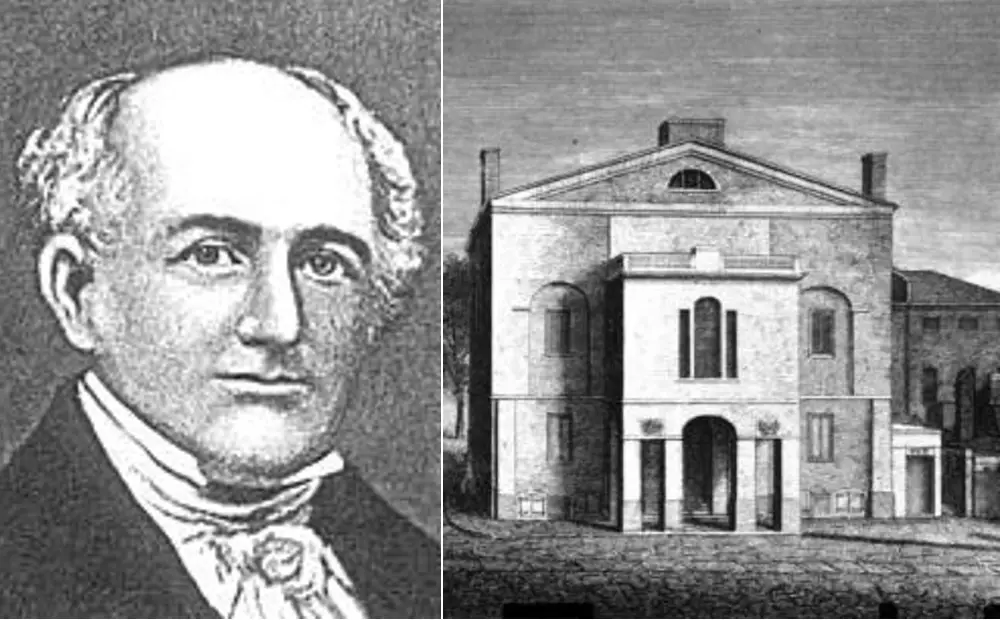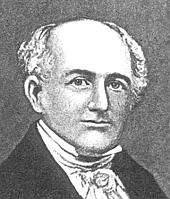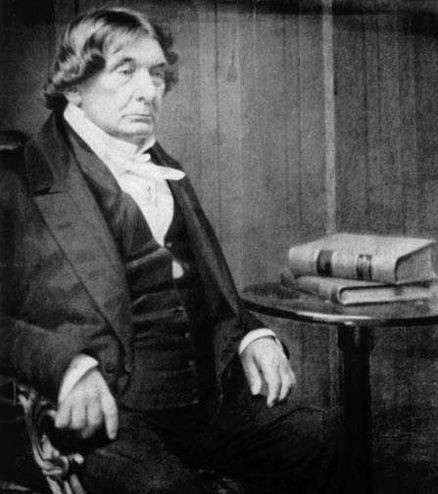Abner Kneeland was a powerful and energetic Universalist minister whose religious doubts and political beliefs sent him to a Massachusetts prison in 1838.
Depending on who you asked, Abner Kneeland was either “a venerable, learned and strictly moral man,” or “hoary-headed apostle of Satan.”
He was also a free thinker and a pantheist, which is what got him into trouble, at least technically. But he was prosecuted as much for telling working people and immigrants to question authority.
His conviction was widely denounced and no one was ever prosecuted for blasphemy in Massachusetts again.
Young Abner Kneeland
Abner Kneeland was born on April 7, 1774 in Gardner, Mass., the sixth of 10 children born to Timothy and Moriah Stone Kneeland. He studied for a year at an academy in Chesterfield, N.H., but then his formal education stopped. Abner and his older brother then moved to Dummerston, Vt., to follow his father’s trade of carpentry. He also taught school and wrote a spelling book. By the age of 27 he joined the Baptist church in nearby Putney, Vt., and began to preach. Within three years he converted to Universalism.
In 1804 he was ordained as an itinerant minister in New Hampshire, and settled down with his wife in Langdon. In 1811 he moved to a promising church in Charlestown, Mass. However, he abruptly resigned the ministry three years later, overcome by religious doubts.
Doubts
Kneeland and his wife then went into the dry goods business in Salem, Mass. His good friend Hosea Ballou, a prominent Universalist theologian, brought him back to the ministry in 1816. He then took up a pulpit in Whitestone, N.Y. But again his doubts asserted themselves.
He moved to a parish in Philadelphia in 1818. Kneeland energetically led the church, publishing sermons and tracts, editing newspapers, compiling a hymnal, translating the New Testament and developing a new system of spelling. He fell under the influence of utopian socialist Robert Owen and began to adopt then-radical ideas about social reform. Before his free thinking got him into trouble in Philadelphia, he moved to a church in New York City.
He began to attract attention, not of the good kind, while preaching in New York. He and his followers broke off from his church, forming the Second Universalist Society, but soon he offended them, too. Kneeland allowed a radical feminist and abolitionist, Frances Wright, to speak from his pulpit when no one else in New York would give her a platform. Universalists from as far away as Maine passed resolutions denouncing him. He questioned the existence of one God and the divinity of Jesus Christ. By 1830, the Universalists kicked him out of the church.
Infidel Orgies
The next year he moved to Boston, where he found a ready audience. As a lecturer for the First Society of Free Enquirers he spoke to 2,000 people on Sunday mornings at the Federal Street Theater and to as many on Wednesdays. Critics called them ‘infidel orgies.’
Two thousand people, mostly poor immigrants, subscribed to his publication, The Investigator. In it, Abner Kneeland criticized the conservative influence of religion on society and supported equal rights for women and all races. He thought women should keep their own names and bank accounts, and he spoke out for birth control, divorce and interracial marriage.
As a member of the Society he believed it wrong to teach children creeds, miracles and religious doctrine. He preached that critical investigation of religious truths was the basis of good citizenship.
Kneeland’s popularity unsettled Boston’s elite. They worried he would influence the laboring classes to disrespect authority and question their humble place in society.
Blasphemy
Abner Kneeland landed in court after declaring his beliefs in 1833. “I am not an Atheist, but a Pantheist; that is, instead of believing there is no God, I believe that in the abstract, all is God,” he said. “[T]he whole duty of man consists in living as long as he can, and in promoting as much happiness as he can while he lives.”
In December 1833 he printed a letter explaining his differences with Universalism. “Universalists believe in a god which I do not; but believe that their god, with all his moral attributes, (aside from nature itself,) is nothing more than a chimera of their own imagination.”
For that, he faced prosecution five times for blasphemy. His first three trials ended in hung juries.
Abner Kneeland used three arguments to defend himself: first, that he never denied the existence of God, he just denied the existence of a god. Second, the law violated the Massachusetts’ Constitution’s guarantee of freedom of religion. And third, the law violated the guarantee of freedom of the press.
The arguments didn’t impress the Supreme Judicial Court, though it took two years for Chief Justice Lemuel Shaw to issue his decision. Shaw’s decision was criticized as one of the worst of the 2,200 he handed down during his career. In it, he argued Kneeland had blasphemed God with malicious intent. He defended Massachusetts’ blasphemy laws, and he concluded freedom of the press did not gibve a ‘general license for scandal, calumny and falsehood.’ Unlimited freedom of the press would prevent authorities from punishing ‘all incitation to treason, assassination, and all other crimes however atrocious.’
Backlash
Ralph Waldo Emerson signed a letter defending Kneeland. So did William Lloyd Garrison, Bronson Alcott and Theodore Parker. More people, however, signed letters supporting the court.
Kneeland served all of 60 days in prison – and became a martyr for the cause of free speech.
The London Investigator criticized the prosecution in 1857. It called Kneeland “a venerable, learned and strictly moral man sentenced and carried to jail for publishing his honest belief on matters of religion.”
“Massachusetts, which is so much extolled as being superior to all other States, is probably the only State in the Union where the Christian bigotry that used to burn heretics at the stake is still suffered to disgrace the statute-book,” remarked the Investigator. The Windsor, Vt., Statesman opined, “that if Kneeland could not speak his mind the very cause for which the Pilgrims came was overthrown. ”
After his release, Abner Kneeland moved to Iowa, where he started a utopian community called Salubria. He died August 27, 1844, and the community failed soon afterward.
With thanks to the Dictionary of Unitarian & Universalist Biography. This story about Abner Kneeland was updated in 2023.





